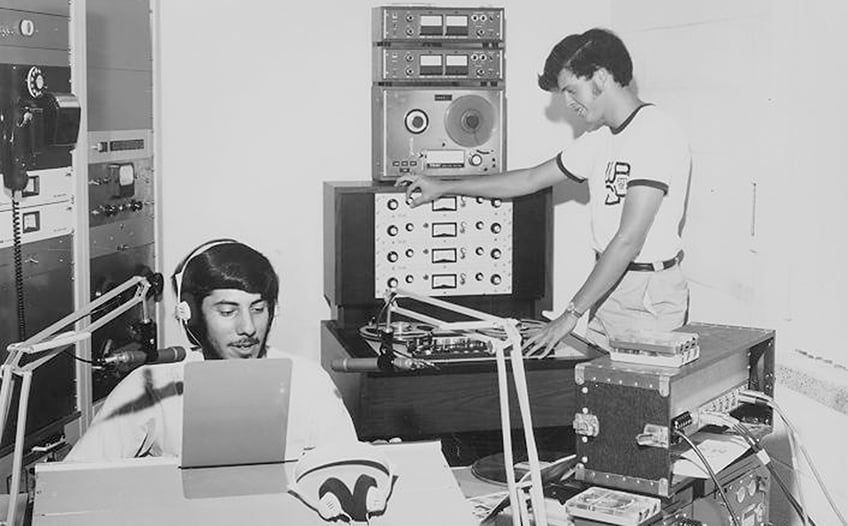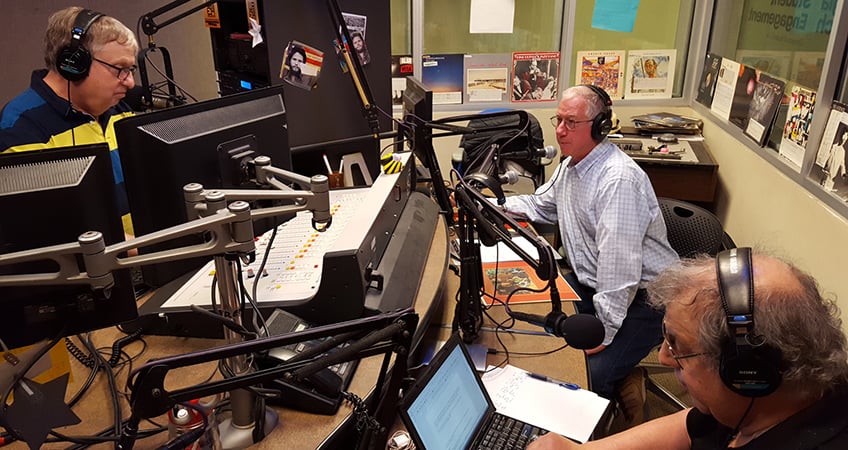The Alternative to Alternative Radio
By: Melissa Fralick | Categories: Tech History

On the night of April 7, the students who operate WREK—Tech’s long-running radio station at 91.1 FM—were replaced.
The regular programming was swapped for a show called WAVES Redux, run by a group of adults who took over the control boards from 9 p.m. to midnight. The takeover wasn’t hostile, but rather a welcome return to the DJ Booth for a few of the Tech alumni who helped develop the station in its early years on the air.
“It’s been 50 years since we twisted knobs and turned buttons,” says Eric Roberts, IE 72. “Here’s two aging alumni from the olden days running this 100,000 watt station with no student supervision. They trusted us to run everything.”

The program was a revival of a show called WAVES, featuring the kind of music they played on Saturday nights in the early 1970s.
The WAVES Redux cameo was just one part of the 50th anniversary of WREK, celebrated during the weekend long WREKtacular festival April 6-8.
WREK alumni from all eras gathered for reunion events and off-campus concerts as part of WREKtacular.
There were happy hours and trivia and dinners, a tour of the WREK studio, and the WREKtacular Music and Arts Show, which featured visual art and performances by 15 musical acts.
WREK has been a force on campus for 50 years, providing students the opportunity to go on the air and broadcast their own unique programs and music, as well as work behind the scenes on all the engineering and computer coding for the radio station.
Unlike many college radio stations, WREK is completely student run and non-commercial. At 100,000 watts, it broadcasts at the maximum power for an FM station, and can be heard in a 70-mile radius throughout metro Atlanta, in places like Kennesaw, Fayetteville and Duluth.
And unlike other university stations, WREK isn’t an extension of a communications or broadcast program. For most students, WREK is purely an extracurricular activity.
Mac Pitts, director of student publications and media for Georgia Tech, says being part of WREK helps students to develop communication skills outside the classroom.
“WREK is a way for students to be creative and step outside their academic rigor and schedule and express themselves,” Pitts says. “Being on the air builds confidence.”
WREK’s official motto is “Quality, diverse music” while the unofficial motto is “Music you don’t hear on the radio.”
WREK’s weekly schedule is organized into blocks of music by genre, punctuated by specialty shows. Depending on when you tune in, you’ll hear DJs spinning a wide variety of music, including reggae, bluegrass, ska, shoegaze, dreampop, punk, new wave, math rock, psychedelic rock, rockabilly, death metal—
and on and on.
It’s different from what you might expect from university stations, which typically play a rotation of alternative and indie rock.
Charlie Bennett Econ 98, STC 00, is a librarian at Georgia Tech and an advisor for the station who co-hosts.
“I didn’t know anything about FM antennas before becoming chief engineer,” Smith says.
“I was taking antenna courses, but the actual application of designing an FM antenna was not something I had studied.
“Using WREK to apply my knowledge was pretty awesome.”
The station has always been on the forefront of changing technology. It was one of the first to stream its programming online. It had a website by the early 90s, long before most people even knew what the Internet was. And in its early years, WREK became the first to broadcast a baseball game in stereo.
While much has changed over the last 50 years, the ethos of the station has remained the same.
The 50th anniversary celebration provided an opportunity for WREK’s earliest alumni and current students to interact and compare notes.
“It’s definitely the same, the culture of the station,” Ganju says. “Their personalities were pretty similar. I was surprised by how much I got along with everyone and how much we had in common despite the 50-year age difference.”
Ganju says it was really heartening to see the early station alumni come together for the WREKtacular anniversary.
“They were all legends in our eyes,” Ganju says. “Building our first transmitters, sharing history and sharing their experiences—it was so cool to meet them all.”
Roberts echoed Ganju’s sentiments about the continuity between generations of WREK students.
“Things have changed in 50 years but certain things haven’t,” Roberts says. “They still have the same passion and love for radio that we did back then. And it comes through on the air.”
The radio station’s early alumni, from 1968-78, call themselves the “Van Leer era” alumni in reference to the electrical engineering building where WREK was first housed.
The Van Leer alumni have remained good friends over the years, and have been getting together every five years for reunions since 1995. They also maintain a website with old photographs, letters and fliers from their time at WREK.
They’re fiercely protective of the station as well, keeping an ear out for anything that could threaten the its status as an independent, student-run operation.
As it turns out, an independent, student-run FM station with a powerful signal in a major metropolitan area is a valuable and increasingly rare thing. Just a few years ago, Georgia State University’s popular radio station WRAS was bought by Georgia Public Broadcasting, relegating student programming to the evening and overnight hours.
“College radio stations are vulnerable,” Bennett says.
But with a history of strong support and investment from the campus community, there’s optimism about the future of WREK. Pitts says plans are now in the works to build the radio station’s next home: a freestanding “shed” on campus with a window into the DJ booth, giving passing students a view into the world of WREK.
Pitts thinks this future visibility will entice curious Tech students to stop in and get involved, whether it’s for the music, the technology or the camaraderie of WREK. A weekly show called “Lost in the Stacks” with several other librarians and archivists.
To illustrate the station’s tradition of being an alternative to alternative music, he points to a long-running program called “Destroy all Music,” which since 1984 has featured very unusual, avant garde music.
“WREK isn’t concerned about audience metrics or fitting a mold,” Bennett says. “You have to stay true to a value rather than a genre or sound—something beyond a marketed college radio sound, or the expectation of what you’re going to hear. There’s a belief in the usefulness of of challenging music.”
Sheena Ganju, IE 18, who graduated in May, served as the most recent general manager of the station. She first came to WREK in her freshman year and held a number of positions at the station throughout her time at Georgia Tech.
She says working at WREK has changed the way she thinks about music.
“I came in with a strong interest in music, but not a strong awareness of what’s out there. I found exposure to all these different, crazy genres I had no idea existed before college but I’m honestly so glad I found,” Ganju says.
Through WREK, she says she’s gotten involved in the Atlanta arts scene—something she likely wouldn’t have otherwise done as an engineering major. Ganju says getting exposure to arts and music in Atlanta was an important part of her college experience.
“I don’t think you can really separate them. I consider both to be crucial parts of my learning at Tech,” Ganju says.
While WREK attracts many self-described “music nerds” who delight in broadcasting obscure music from across the spectrum of sound, the station’s powerful signal is an equally strong draw for students interested in radio engineering.
“I’d say the majority of people join WREK because they care about the music,” says Daniel Smith, EE 11, MS ECE 12. “That wasn’t me—I was always all about the engineering. I liked making cool stuff.”
Smith was the chief engineer for WREK as a student and now serves as a technical advisor for the station. During his tenure, he had the unique experience of helping to build a new antenna to upgrade the station from 40,000 to 100,000 watts—the maximum power for an FM station.
Most university stations hire professional engineers to handle the technical work. But at WREK, there are engineering students like Smith who have the knowledge and pluck to do it themselves.


